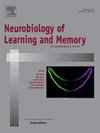The REM effect: How sleep stages influence learning strategies in complex reward-based decision-making
IF 1.8
4区 心理学
Q3 BEHAVIORAL SCIENCES
引用次数: 0
Abstract
Model-free (MF) and model-based (MB) learning strategies are complementary decision-making processes used in evaluating choices with potential rewards. Disorders involving compulsive behaviours (e.g., substance use, gambling) are suggested to emerge from an overreliance on MF learning, though the reasons for this bias remain unclear. Sleep disruptions, common in these disorders, could be a contributing factor, however no study has examined the impact of sleep and/or sleep loss on an individual’s engagement of each strategy. Thus, this study examined the influence of sleep on MF/MB learning in healthy adults. Participants (n = 67, Mage = 26.21yrs, SD = 5.82yrs, females = 65.67%) completed a two-stage reinforcement learning paradigm following a week of either sleep restriction (5-hr time in bed/night) or well-rested sleep (9-hr/night). Using mixed-effect logistic regressions and comprehensive computational modelling, we found no differences in MF and MB learning based on sleep condition (all p = > 0.05). However, regressions showed less REM sleep was associated with increased use of MB learning, whilst greater levels of REM sleep were associated with increased use of MF learning. Computational modelling supported this, revealing negative associations between the MB parameter estimate and REM sleep percentage (τ = -0.22, p = 0.02). This suggests the amount of REM sleep prior to learning may potentially play a role in determining which strategy will dominate. In particular, individuals with less REM sleep may be less willing or able to assess the relative costs and benefits of each strategy. Future research should explore this relationship further.
快速眼动效应:睡眠阶段如何影响基于奖励的复杂决策中的学习策略。
无模型(MF)和基于模型(MB)的学习策略是互补的决策过程,用于评估具有潜在回报的选择。强迫性行为(例如,药物使用,赌博)的障碍被认为是过度依赖MF学习的结果,尽管这种偏见的原因尚不清楚。在这些疾病中常见的睡眠中断可能是一个促成因素,但没有研究调查睡眠和/或睡眠不足对个人参与每种策略的影响。因此,本研究考察了睡眠对健康成人MF/MB学习的影响。参与者(n = 67,男 = 26.21yrs, SD = 5.82yrs,女性 = 65.67 %)在一周的睡眠限制(每晚5小时的床上时间)或充分休息的睡眠(每晚9小时)后完成了两阶段的强化学习范式。使用混合效应逻辑回归和综合计算模型,我们发现基于睡眠状态的MF和MB学习没有差异(p = > 0.05)。然而,回归结果显示,快速眼动睡眠时间越短,脑动神经学习的使用越多,而快速眼动睡眠时间越长,脑动神经学习的使用越多。计算模型支持这一点,揭示了MB参数估计与REM睡眠百分比之间的负相关(τ = -0.22,p = 0.02)。这表明,学习前的快速眼动睡眠时间可能在决定哪种学习策略占主导地位方面发挥着潜在的作用。特别是,快速眼动睡眠较少的人可能不太愿意或无法评估每种策略的相对成本和收益。未来的研究应进一步探讨这种关系。
本文章由计算机程序翻译,如有差异,请以英文原文为准。
求助全文
约1分钟内获得全文
求助全文
来源期刊
CiteScore
5.10
自引率
7.40%
发文量
77
审稿时长
12.6 weeks
期刊介绍:
Neurobiology of Learning and Memory publishes articles examining the neurobiological mechanisms underlying learning and memory at all levels of analysis ranging from molecular biology to synaptic and neural plasticity and behavior. We are especially interested in manuscripts that examine the neural circuits and molecular mechanisms underlying learning, memory and plasticity in both experimental animals and human subjects.

 求助内容:
求助内容: 应助结果提醒方式:
应助结果提醒方式:


